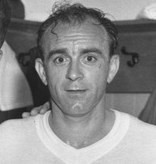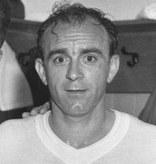Buenos Aires (Argentina), 1926 – Madri (Espanha), 2014
By Pablo Alabarces

Alfredo Di Stefano on the Argentina national team, in 1947 (Wikimedia Commons)
to Huracán and returned to River, the team where he would become famous. In 1947, the year of his breakthrough, he won the Argentine Championship title, was the top scorer of the tournament (with 27 goals), and was called up to the national team that competed in the South American Championship held in Ecuador. Argentina won the title thanks to a great team that, besides Di Stéfano, included José Manuel Moreno, Félix Loustau, and Néstor Raúl Rossi, his teammates at River Plate. In August 1949, after a strike by professional Argentine players the previous year, Di Stéfano and Rossi went to Colombia, where clubs registered with the Colombian Football Association (a split from the country’s Federation) had begun buying the most important South American stars. He stayed for four years at Millonarios in Bogotá and then transferred to Real Madrid in Spain. With his new team, he won the club’s first five European Cups (1956-1960), a competition in which he scored 49 goals, one International Cup (1960), eight Spanish League titles (1954, 1955, 1957, 1958, and 1961-1964), and one Spanish Cup (1962). He was the league’s top scorer five times (1954, 1956, 1957, 1958, and 1959) and, alongside players like Francisco Gento and Ferenc Puskás, helped Real Madrid define an era in Spanish and European football. He naturalized as a Spanish citizen and joined the national team, but never participated in a World Cup: Spain did not qualify in 1958, and he was injured in 1962.





